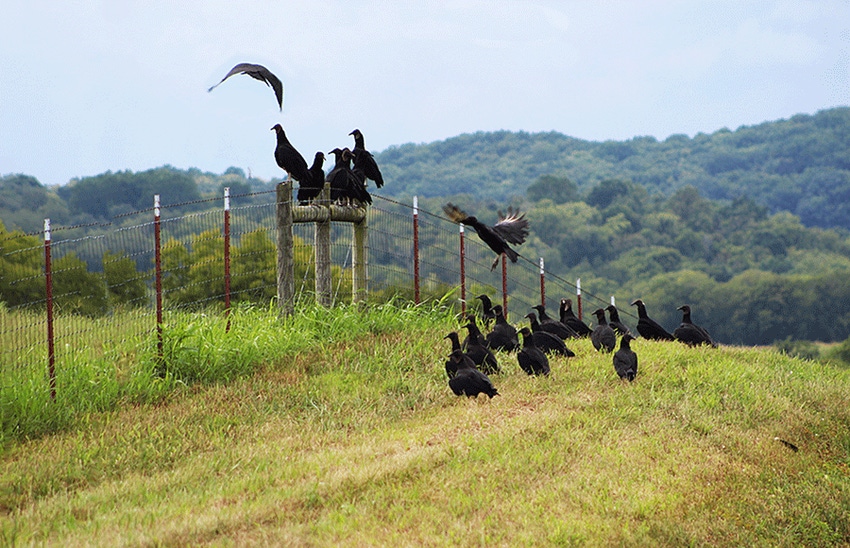
Following my recent column (https://bit.ly/2JN4fhn)about how black vultures/buzzards are causing problems for Mississippi livestock producers — not to mention chowing down on vehicle wiper blades/rubber window seals/roofing/pool liners and other tasty tidbits — Mike Sharp, retired Tennessee Extension agent at Sevierville, phoned to say his state has taken measures to deal with the birds, which are protected by the Federal Migratory Bird Treaty Act.
“These birds are a real concern for livestock farmers throughout the area,” he says. “Big groups of them can be a real problem for newborn calves and mamma cows that have just given birth. Several producers have lost young calves, and one backgrounder reported the birds coming into the barn where calves were being castrated, attracted by the blood.”
Black vultures are much more aggressive than the more docile turkey buzzards, Sharp says, and when feeding will chase away the red-headed birds. In 2015, according to USDA’s APHIS Wildlife Services, Tennessee livestock producers reported losses of 233 cattle to black vultures.
“The federal act makes it illegal to kill or destroy black vultures without a permit from the United States Fish and Wildlife Services,” Sharp notes, “and while you could pay $100 annually for a permit to take the birds in situations where they were killing livestock or causing other problems, it was a somewhat slow, cumbersome process.”
A homeowner returned from a weekend vacation to find black vultures had done more than $25,000 in damage, including eating plastic seat covers on a motorcycle and jet ski, pecking away paint on a car, damaging swimming pool equipment, tearing out insulation, pecking away mortar between bricks, and generally wreaking havoc.
In 2015, the Tennessee Senate Energy, Agriculture, and Natural Resources Committee voted to legalize the killing of black vultures. The bill repealed a state law that made it a misdemeanor “to disturb the habitat of, alter, take, attempt to take, possess, or transport a black vulture, also known by the name Coragyps atratus.”
Sen. Paul Bailey of Sparta, Tenn., told of a homeowner who came back from a weekend vacation to find black vultures had done more than $25,000 in damage, including eating plastic seat covers on a motorcycle and jet ski, pecking away paint on a car, damaging swimming pool equipment, tearing out insulation, pecking away mortar between bricks, and generally wreaking havoc.
After working with state and federal elected and agency personnel, in March this year Rhedona Rose,chief administrative officer and executive vice president of the Tennessee Farm Bureau organization, in a letter to presidents of all county Farm Bureaus in the state, advised, “We are pleased to announce that the Tennessee Farm Bureau Federation board of directors has obtained a statewide depredation permit for black vultures from the United States Fish and Wildlife Service.”
She noted that TFBF would now issue sub-permits to livestock producers experiencing problems with black vultures. “The statewide depredation permit provides Farm Bureau members who are livestock producers an opportunity to apply for a livestock protection depredation sub-permit that allows legal ‘takes’ of black vultures that are attacking livestock.”
The statewide permit is administered by TFBF and there is no cost to members who apply for a livestock protection depredation sub-permit. Applicants must agree to follow all rules and regulations required by U.S. Fish and Wildlife Service in the TFBF statewide permit, including adoption of non-lethal measures to deter black vulture depredation; use of shotguns and non-toxic shot in the lethal taking of depredating black vultures; reporting takes quarterly to Tennessee Farm Bureau; and using black vulture carcasses as effigies in areas where depredation is occurring.
Sub-permits will be issued to livestock operations only, Rose notes, and applications will be scored based on the information provided, regarding past depredation history, proximity of black vulture roosts, number of livestock on the farm, and the general livestock density of the area based on the most recent Tennessee Agricultural Statistic Service. Producers approved for sub-permits will receive a signed approval and sub-permit, an allotted number of black vulture takes, a copy of the Tennessee Farm Bureau statewide depredation permit, guidelines for removal methods, and a black vulture dispatch log.
Producers may apply for the TFBF livestock protection depredation sub-permit by completing an application and returning a signed copy to Tennessee Farm Bureau, Attn: Debbie Briggs, P.O. Box 313, Columbia TN 38402.
Those experiencing extreme depredation (homes, barns, businesses, other non-livestock situations) and large black vulture roosts are encouraged, Rose says, to apply for an individual black vulture depredation permit with U.S. Fish and Wildlife Service, which can allow approval by USFWS for a larger number of takes. The cost of an individual depredation permit is $100.
Mike Sharp, who still has a keen interest in agriculture after retirement, posts regularly on a blog. You can check it out at https://agricultureatitsbest.weebly.com/
Information on the Farm Bureau sub-permit can be found at https://bit.ly/2LNgZCb
About the Author(s)
You May Also Like




